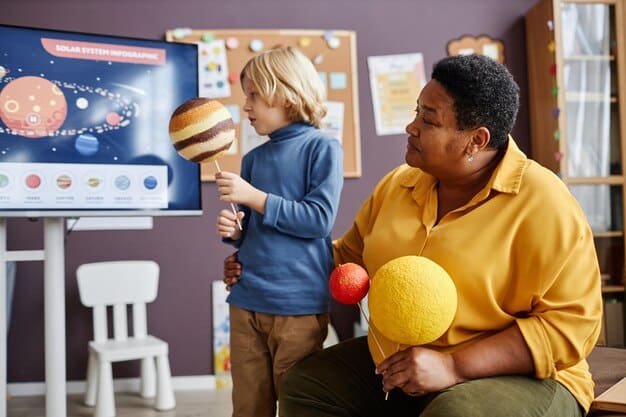Console Gaming and Education: Boosting Cognitive Skills & Learning

Console gaming significantly contributes to education by enhancing cognitive skills such as problem-solving, critical thinking, and memory, providing an engaging and interactive learning experience for students of all ages.
Have you ever considered that your favorite console games might be doing more than just entertaining you? The world of console gaming and education: how games can improve cognitive skills and learning is vast, offering surprising benefits that extend far beyond the screen.
The Cognitive Benefits of Console Gaming
Console gaming is often seen as a purely recreational activity, but it offers a wide array of cognitive benefits. These benefits extend to various areas of mental performance, making gaming a potentially valuable tool for education and personal development.
Let’s explore how console games can act as brain boosters, affecting everything from problem-solving skills to memory and attention.
Enhancing Problem-Solving Skills
Many console games require players to think strategically and solve complex problems. These challenges stimulate the brain and improve analytical thinking.
Boosting Memory and Attention
Games often require players to remember intricate details and focus their attention for extended periods. This can improve memory retention and concentration skills.

- Strategic Thinking: Games that require planning and resource management enhance strategic thinking skills.
- Rapid Decision-Making: Fast-paced games force players to make quick decisions under pressure, improving reaction time and decision-making abilities.
- Pattern Recognition: Many games involve recognizing and interpreting patterns, which can boost cognitive flexibility.
In conclusion, console gaming can be a powerful tool for cognitive enhancement, providing engaging challenges that boost problem-solving skills, memory, and attention.
Console Games as Educational Tools
Console games are increasingly recognized for their potential as educational tools. By integrating games into the curriculum, educators can create more engaging and effective learning experiences.
From history to science, console games offer interactive ways to explore various subjects and reinforce educational concepts.
Interactive History Lessons
Games that recreate historical events or settings can provide immersive experiences that help students understand and remember historical information more effectively.
Science and Simulation Games
Simulation games allow students to experiment with scientific concepts in a safe and controlled environment, enhancing their understanding of complex systems.
- Engaging Content: Games capture students’ attention and motivate them to learn.
- Active Learning: Games promote active participation and critical thinking.
- Real-World Application: Games can simulate real-world scenarios, helping students apply what they learn.
Ultimately, console games can transform education by offering interactive, engaging, and effective ways to learn a wide range of subjects.
Cognitive Skills Developed Through Gaming
Engaging with console games fosters a range of cognitive skills essential for academic and professional success. These skills are honed through the challenges and demands inherent in gaming.
Understanding the specific cognitive skills developed can help educators and parents appreciate the educational value of console gaming.

Improved Spatial Reasoning
Many games require players to navigate complex environments and visualize spatial relationships, enhancing their spatial reasoning abilities.
Enhanced Creativity and Imagination
Games that encourage creativity and storytelling can stimulate the imagination and foster creative thinking.
- Attention Span: Games require sustained focus and attention, improving players’ ability to concentrate.
- Critical Thinking: Solving puzzles and overcoming challenges in games enhances critical thinking skills.
- Decision-Making: Making quick decisions under pressure in games improves decision-making abilities.
In summary, console gaming develops crucial cognitive skills such as spatial reasoning, creativity, and attention span, contributing to overall intellectual growth and success.
Types of Console Games and Their Educational Value
Different types of console games offer unique educational benefits. Understanding the various genres and their specific contributions can help parents and educators select games that align with their learning objectives.
From strategy games to simulation games, each genre offers distinct opportunities for cognitive development and academic enrichment.
Strategy Games
Strategy games require players to think critically, plan ahead, and manage resources effectively. These games enhance strategic thinking and problem-solving skills.
Adventure Games
Adventure games often involve solving puzzles, exploring environments, and interacting with characters, fostering creativity and critical thinking.
- Role-Playing Games (RPGs): RPGs encourage empathy, decision-making, and storytelling skills.
- Simulation Games: Simulation games allow players to experiment with real-world systems and concepts.
- Puzzle Games: Puzzle games boost logical thinking and problem-solving abilities.
Ultimately, exploring different types of console games can reveal their unique educational value, providing opportunities for cognitive enhancement and skill development.
Integrating Console Gaming into the Classroom
Integrating console gaming into the classroom can revolutionize the learning experience. By thoughtfully incorporating games into educational activities, teachers can create more engaging and effective lessons.
From supplementing traditional teaching methods to creating entirely game-based learning environments, there are numerous ways to integrate console gaming into education.
Supplementing Traditional Teaching
Console games can be used to reinforce concepts taught in traditional lessons, providing an interactive and engaging way for students to practice what they’ve learned.
Creating Game-Based Learning Environments
Entire learning environments can be designed around console games, with educational objectives integrated into the gameplay.
- Collaborative Projects: Games can be used for collaborative projects that require teamwork and communication.
- Assessment Tools: Games can be used as assessment tools to evaluate students’ understanding of key concepts.
- Personalized Learning: Games can be tailored to meet the individual needs and learning styles of students.
In conclusion, integrating console gaming into the classroom can transform education, offering dynamic and effective ways to supplement traditional teaching and create engaging learning environments.
Addressing Concerns and Misconceptions
Despite the many benefits, console gaming often faces concerns and misconceptions. Addressing these issues with factual information and balanced perspectives is crucial for realizing the full potential of gaming in education.
From concerns about addiction to worries about violence, it’s important to approach these topics with an open mind and evidence-based solutions.
Concerns about Addiction
Gaming addiction is a valid concern, but it can be managed with responsible gaming habits and parental guidance. Setting time limits and encouraging balanced activities can help prevent addiction.
Misconceptions about Violence
Not all console games are violent, and many offer positive messages and educational content. Selecting age-appropriate games and discussing the content with children can help mitigate concerns about violence.
- Parental Involvement: Parents should be involved in their children’s gaming habits, monitoring the games they play and setting boundaries.
- Balanced Lifestyle: Encourage a balanced lifestyle that includes physical activity, social interaction, and other hobbies.
- Educational Content: Focus on games that offer educational value and promote cognitive development.
In summary, addressing concerns and misconceptions about console gaming with informed perspectives and practical solutions can pave the way for its effective integration into education.
| Key Benefit | Brief Description |
|---|---|
| 🧠 Cognitive Skills | Boosts problem-solving, memory, and strategic thinking. |
| 🎮 Educational Tool | Enhances learning through interactive history and science lessons. |
| 💡 Creativity | Sparks imagination and fosters innovative solutions. |
| 🤝 Teamwork | Promotes collaboration and communication skills. |
FAQ Section
▼
Many console games require strategic thinking and quick decision-making, which helps in developing problem-solving skills. Players learn to analyze situations and devise effective solutions.
▼
Strategy, adventure, and simulation games often have great educational value. These games encourage critical thinking, creativity, and experimentation with real-world concepts.
▼
Parents can set time limits, monitor game content, and encourage a balanced lifestyle that includes physical activity and other hobbies. Open communication about gaming is also important.
▼
Yes, many console games demand sustained focus and attention, which can improve players’ ability to concentrate. This is particularly true for games that require intricate strategies.
▼
Teachers can use games to supplement lessons, create engaging learning environments, and develop collaborative projects. Games can also be used as assessment tools to evaluate students’ understanding.
Conclusion
In conclusion, console gaming offers significant cognitive and educational benefits. From enhancing problem-solving skills to providing interactive learning experiences, games can be powerful tools for intellectual growth. By addressing concerns and integrating games thoughtfully, we can unlock their full potential in education.